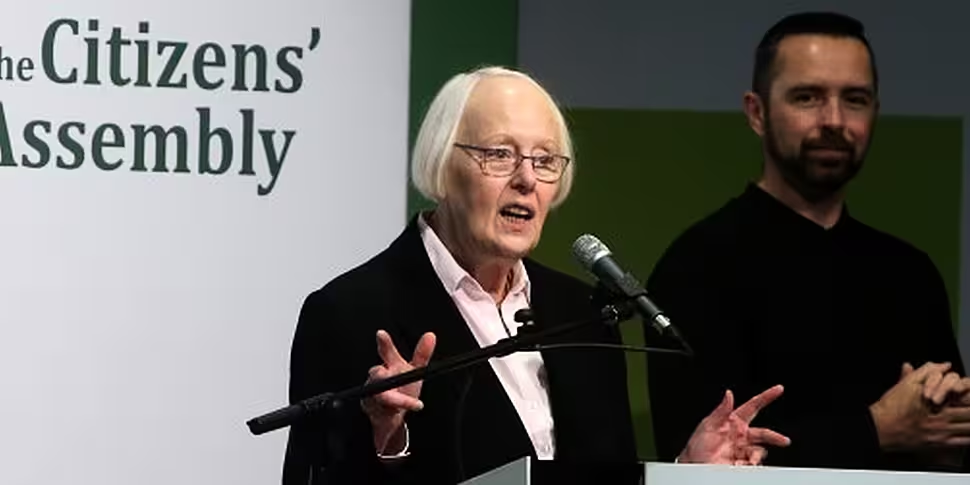The report and recommendations of the Citizen’s Assembly regarding the Eighth Amendment have been published this morning.
The recommendations will now be referred to Joint Oireachtas Committee on the Eighth Amendment of the Constitution before further debate in the Dáil and the Seanad.
The chair of the Assembly, Ms Justice Mary Laffoy said the report aims to ensure that there is a “clear, complete and accurate record” of the work the Assembly undertook on the abortion issue so that there is “openness and transparency” regarding how the group’s membership of 100 citizen’s came to their recommendations.
Following five weekends of meetings the Assembly, members voted that Article 40.3.3 of the Constitution should not be retained in full and should be replaced or amended.
The Assembly recommended that the article should be replaced with a constitution provision explicitly authorising the Oireachtas to legislate in order to address the abortion issue, the rights of the unborn and of the pregnant woman.
Legislative recommendations
The group also made further recommendations on what should be included in any new legislation.
The recommendations include the reasons for which termination of pregnancy should be lawful in Ireland, as well as any gestational limits that should apply.
Ms Laffoy said it is essential the Oireachtas fully understands the backdrop and the process that led the Assembly to make its recommendations in “this very complex area of law.”
“Put simply, most of the members voted that they wanted to remove Article 40.3.3° from the Constitution and - for the avoidance of doubt - to replace it with a provision in the Constitution which would make it clear that termination of pregnancy, any rights of the unborn and any rights of the pregnant woman are matters for the Oireachtas,” said.
“In other words, it would be solely a matter for the Oireachtas to decide how to legislate on these issues.”
Affirmation of human rights
The report has been welcomed today Amnesty International as well as a number of pro-life organisations.
Colm O’Gorman, executive director of Amnesty International Ireland said the Assembly recommendations offered “a momentous affirmation of the human rights of women and girls in Ireland.”
“Ireland’s laws on access to and information about abortion are abusive and intolerable,” he said.
“The government has been instructed to reform these laws by five UN human rights treaty bodies.
“It has been found by the UN to have inflicted cruel, inhuman and degrading treatment on two women by making them travel abroad for abortions. This needs to stop. Today, we have a roadmap for reform. There can be no more excuses and no more delays.”
Earlier this month, the Taoiseach Leo Varadkar confirmed there would be a referendum on the Eighth Amendment in 2018.
Referendum for abortion reform
The Coalition to Repeal the Eighth Amendment said the report “brings to the fore the fact that a majority of the Assembly, representing a cross section of the Irish electorate, voted for root and branch reform to abortion laws in Ireland.”
Coalition spokesperson Ailbhe Smyth called on the Oireachtas Committee to recommend a referendum “as soon as possible.”
The Pro Life Campaign (PLC) on the other hand said the Assembly was a “farce” and called on the upcoming committee to investigate how the Assembly came to its recommendations.
“Before considering anything else, the new Oireachtas Committee on abortion has a responsibility to investigate how the Citizens’ Assembly became such a campaigning body and abandoned even the pretence of balance,” said PLC spokesperson Dr Ruth Cullen. “The new Committee’s credibility rests on whether it corrects this imbalance.”
Informed decision
Ms Laffoy said the Assembly was an “exercise in deliberative democracy” based on an exchange of information and justifications – rather than a “competition between conflicting interests.”
She said the Eighth Amendment remains “one of the most complex and divisive subjects in public life in Ireland” adding that holding a “balanced, fair and above all informative and evidence based” discussion on the issue was her guiding principle as chair of the Assembly.
In addition to its recommendations on the Eighth Amendment the Assembly also indicated its support for a range of wider policy issues.
Ancillary recommendations
Members were invited to write down their comments and suggestions on policy with five main ancillary recommendations included in the report.
- Improvements should be made in sexual health and relationship education, including in the areas of contraception and consent
- Improved access to reproductive healthcare services to be made available to all women, including family planning services, contraception, perinatal hospice care and termination of pregnancy where required
- Access to the same standard of obstetrical care for all women
- Improvements to be made in counselling and support facilities for pregnant women both during pregnancy and, if necessary, following a termination
- Further consideration to be given to who will fund and carry out terminations of pregnancy in Ireland
Members also called for the decriminalisation of abortion - including the use of the abortion pill - and the recognition and protection of female reproductive rights and autonomy.
The full report and recommendations on the Eighth Amendment to the Constitution can be found here.









